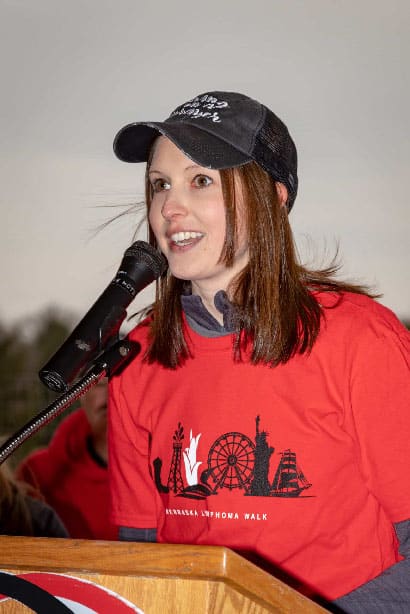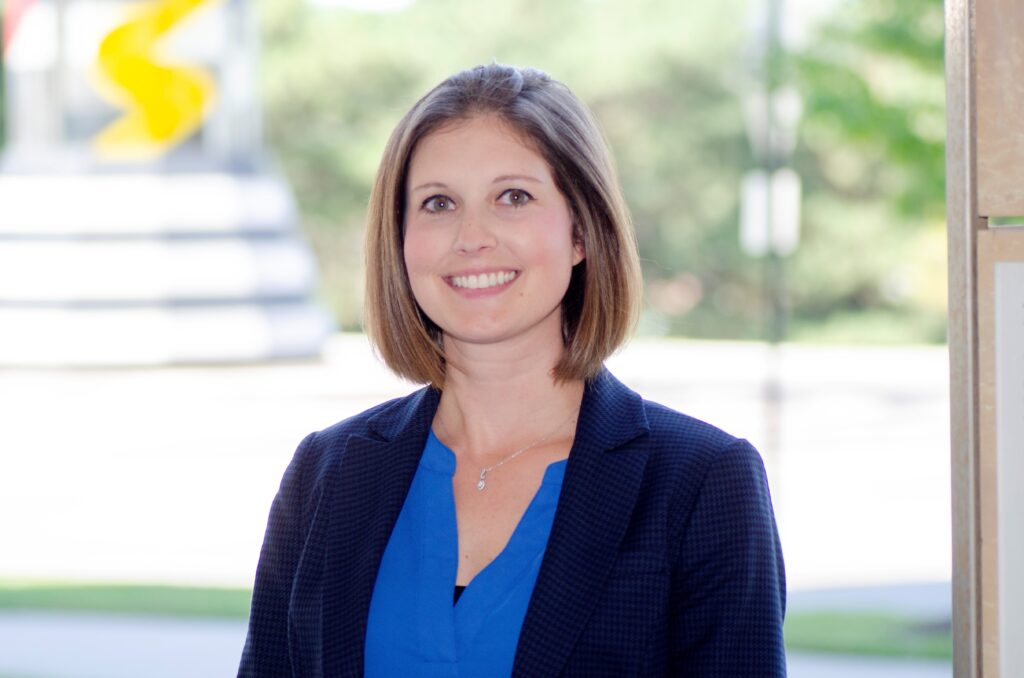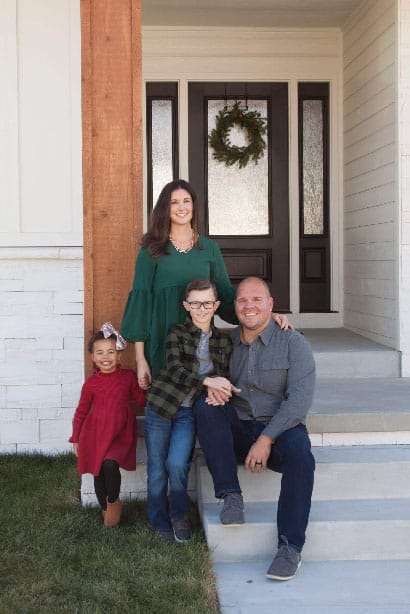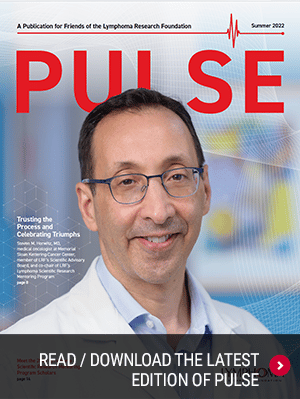Right Place at the Right Time

Sometimes, life has a strange way of preparing us for what’s ahead, even though we might not realize it at the time. For Tawny Roeder, a 37-year-old part-time nurse, and full-time wife and mother of two, a rotation in the oncology unit during her final year in nursing school ended up having a much bigger impact on her career — and her life — than she could have ever anticipated.
Originally from Storm Lake, Iowa, and currently living in Papillion, Nebraska, Roeder was in the final semester of her senior year in nursing school in 2008. As she was beginning her nursing preceptorship, she was assigned to the oncology unit where she began taking care of patients facing a lymphoma diagnosis and other health issues. During her first shift, the first room she entered was with a 19-year-old girl with non-Hodgkin lymphoma (NHL) receiving her first treatment.
“As I walked in, I remember seeing her hair all over the pillow, and I didn’t know what to say,” she says. “My heart went out to this girl, and I just could not believe what she was going through. At the time, I didn’t have anyone in my life with cancer, and all I could do was think about how I could best relate to her and help make her comfortable.”
As fate would have it, just two to three weeks after beginning that rotation, Roeder was diagnosed with lymphoma herself and admitted to the same oncology unit where she had been taking care of others just weeks before.
“I was experiencing intense pain that would radiate through the back of my shoulders,” Roeder explains. “It was growing worse, waking me up at night and making it difficult for me to breathe. I was captain of the dance team in college and found myself completely out of breath after just one or two run-throughs of our routine, which wasn’t like me at all.”
Roeder’s mom was the first to notice her shortness of breath during a visit and encouraged her to get it checked out. They went to the doctor together to see if they could get to the bottom of it.
“Honestly at that point in my life, I thought I was invincible, so cancer was the last thing on my mind,” says Roeder. “When my doctor told me that I had a mass on my lung that was causing my back pain and shortness of breath, I was dumbfounded.”
Soon after, Tawny went to have a biopsy in neighboring South Sioux City and they informed her over the phone that she had diffuse large B-cell lymphoma (DLBCL), the most common type of NHL in the United States and worldwide. Later, she would learn that she had gray zone lymphoma, a rare type of lymphoma that has features somewhere between classical Hodgkin lymphoma (HL) and DLBCL.
“I remember hanging up the phone and immediately calling my boyfriend (now husband), Cory, and he came right over, as did family and friends,” says Roeder. “By the end of the day, I was still in shock, but grateful to be surrounded by the people closest to me for support”
From Lymphoma Nurse to Lymphoma Patient
For Roeder, the biggest adjustment was going from being a nursing student helping others, to having to come to terms with the fact that she had a potentially life-threatening disease.
“I’m still not sure if I fully processed everything the doctors were telling me,” Roeder says. “I remember feeling very afraid and alone at the time.”
“My first thought was, ‘Will I ever be able to be a mom?’”
The mass by her lungs was growing quickly and her doctors recommended that she begin a standard R-CHOP regimen immediately (rituximab [Rituxan], cyclophosphamide [Cytoxan], doxorubicin [Adriamycin], vincristine [Oncovin], and prednisone [Deltasone]).
“I was only two months away from graduating college, and I didn’t want to jeopardize that, so I decided to get my treatment in my college town,” says Roeder. “I started treatment in April 2008, and I was focused on getting through treatment as quickly as possible so that I could graduate with my friends, get my nursing degree, and take my boards.”
To accomplish her goal, Roeder studied for her boards while getting chemo treatments — and while she didn’t feel great on her graduation day, she was able to attend her graduation as planned and take her boards in mid-July. She received her last round of treatment at the end of July, but much to her dismay, her journey with lymphoma was not yet over.
A New Challenge

Following her last round of treatment, Tawny’s doctors declared her in remission but were still concerned about high-risk factors related to diagnosis and referred her to Nebraska Medical Center in Omaha for an autologous stem cell transplant.
“The transplant seemed so much scarier than the chemotherapy, and I didn’t feel prepared for it,” Roeder
explains. “Still, I understood that I needed the transplant to increase my odds for long-term survival and so I
pushed on.”
She received her transplant on September 11, 2008, and it thankfully went smoothly. However, spending a month isolated in the hospital following her transplant took an emotional toll on her that she wasn’t expecting. While she watched her friends begin their nursing careers and move on with their lives, she couldn’t help but feel lonely, sad, and stuck as she waited to be done with treatment.
“I’ll never forget the feeling I had the day I was finally released from the hospital,” says Roeder. “It was a
beautiful day and I remember rolling down the car window and letting my head hang out of the car, feeling
the fresh breeze wash over me and finally feeling free.”
Chomping at the bit to start her nursing career, Roeder started her first job in November 2008 — just two months after receiving her stem cell transplant. While she began her nursing career in pediatrics, she felt called to return to the oncology department, becoming a lymphoma transplant case manager, where she guides patients through the treatment process that saved her life. She’s been in that role at the University of Nebraska Medical Center for about ten years and uses her own journey with lymphoma to help provide comfort to her patients going through a similar experience.
“Young people need extra hope that they can have a career, build a family and just live their lives beyond cancer.”
“When I share with my patients that I was in their shoes about 14 years ago, they are absolutely shocked,” Roeder says. “The biggest thing I tell my patients – and it’s something that I wish someone would have told me – is that this, too, shall pass. You will not feel like this forever, the side effects are temporary, your treatment will end, and you will feel better.”
Giving Back
Roeder is passionate about giving back and does so not only through her work as a nurse, but also through
organizations such as the Lymphoma Research Foundation (LRF). She first got involved with LRF following her treatment, after learning about the organization from one of her doctors. She started by walking in the Nebraska Walk in 2010 and forming “Team Tawny,” consisting of her family and friends who helped her raise funds for LRF’s mission. In 2018, she was named the honorary chair of the walk, in recognition of her dedication to the Foundation, and continued to participate in the event up until the onset of the pandemic.

“The walks create a strong sense of community, and the opportunity to meet other survivors who understand what I’ve gone through,” says Roeder.
“More than anything, LRF has helped me feel less alone in my diagnosis and has given me the opportunity to give back to a community that means the world to me.”
Having begun her lymphoma journey at the age of 23, Roeder is proud of how far she has come since being diagnosed and hopes that her story can inspire other young patients to never give up hope or on their dreams.
“Young people need extra hope that they can have a career, build a family, and just live their lives beyond cancer,” says Roeder. “In my case, I went from taking care of people with lymphoma to facing my own lymphoma diagnosis in a matter of weeks. I would encourage any young person dealing with a lymphoma diagnosis to not give up on their dreams. At first, I didn’t think I’d be able to be a mom, but we’ve been able to adopt both of our wonderful kids at birth, and honestly, I can’t see it any other way. I’m living proof that life goes on after lymphoma.”
Read More Articles from Pulse
Pulse is a publication of the Lymphoma Research Foundation, providing the latest updates on the Foundation and its focus on lymphoma and chronic lymphocytic leukemia (CLL) research, awareness, and education



